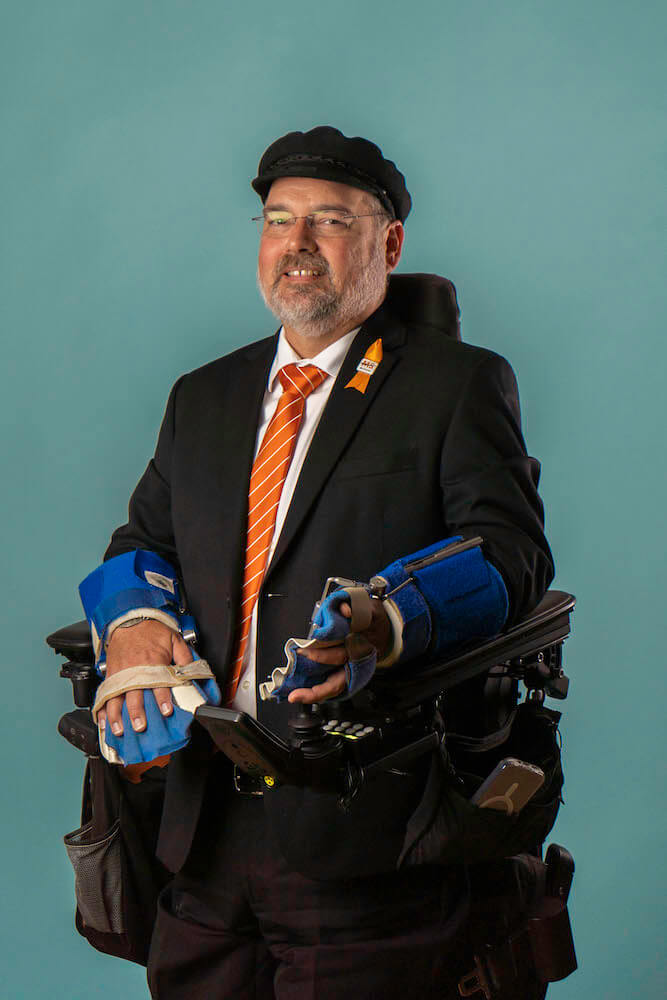About Scott
Dr. Scott Crawford has a PhD in neuropsychology, the study of brain-behavior relationships.
In 2000, he had several episodes that left him temporarily paralyzed, but it wasn’t until two years later that he was officially diagnosed with multiple sclerosis.
After his diagnosis, he moved back to his hometown of Jackson, Miss., where he has become an advocate for accessible infrastructure. He also founded Keep Building Jackson, where he has recreated many of Jackson’s buildings to scale using Legos.
He enjoys creating with Legos because, as he says, “building with LEGO bricks is a metaphor for dealing with adversity. One never has all the bricks one wants, and sometimes we lose them. I do as my disease (multiple sclerosis) progresses. We’re left to rebuild with what we have left.”
Scott Crawford on Ableism
[00:00] I’m Scott M. Crawford, I have a PhD, and I live in Jackson, Mississippi. In 2002, I almost died until a world renowned expert by the name of William Sheremata. He looked at the same MRI that everybody else said was clean. And he said, "Scott, you've got a lesion here, you've got a lesion here, you've got a lesion here, and I'm going to put you on novantrone." Multiple sclerosis is believed to be an autoimmune disorder. Like many other autoimmune disorders, one's own white blood cells, our immune system, T cells, antibodies, B cells, attack healthy tissue, somewhere in the body. Now with MS, it's always the brain and spinal cord.
[00:53] You know, everybody that has an acquired disability has to let go of their old life and create a new life, life with meaning. For me, it was going back to Jackson and realizing I'm needed here. You know, they had completely ignored the Americans with Disabilities Act. Most people didn't know what it was. When I said ADA, they didn't go "A-D what?," they didn't know what it was. And I said, "okay, this is why I'm here." The ableism.
[01:30] The worst thing about any -ism, any discrimination, is that when you hear the message over and over again, that you're lesser than, you don't have the right to make decisions about your body, your sexual orientation is not as good as ours, your gender identity doesn't fit in, your differently abled self doesn't deserve to sit with everybody else. So what you have to go around the side of the building, when everybody else is going around the front. That's the ableism that we see. And they don't even get that going around the side of the building is a problem. And I'm like, look back to the 1950s when we had quote "colored entrances." Shameful, shameful, this is exactly the same thing happening in 2022. People need to be shown the obstacles, the barriers, and encouraged to get rid of them to create a more welcoming society.
[02:25] Mostly, it's about wishing I had more allies. I try to get friends and allies to join me in a movement, you know, to struggle for an accessible courthouse, to struggle for accessible sidewalks. Um (sighs) you know, and I don't get any buy in. You know, they, they, they won't join me. And I'm like, "Well what are you doing with your life? I mean, this is important to us. It's important to everyone. You know, and, uh, are you just going to let me try to do this on my own?” It’s like, I can't do it on my own.
[03:06] It doesn't take a lot because when you look back at the history of ADA, and I have, and I've done my research on that, it wasn't a lot of people. It was a few committed people that put everything on the line and stopped at nothing to get that to happen. I mean, crawling up the steps of the Capitol, chaining themselves together in the rotunda and saying, "Come on, arrest us, make my day." And that's really what got it done. And we need that kind of commitment now.
[03:48] What would you say our problem is? Complacency. Complacency, expecting other people to do it for us. It's not going to happen. You know, we are the cavalry that we're all wanting, you know, we don't have to do it alone. We can't do it alone. But, you know, this complacency, just expecting someone to make it better. No, that doesn't fly with me. It'll never fly. And things will never change if we continue that. We have to take responsibility for the problems that we have, and work together to solve them.

